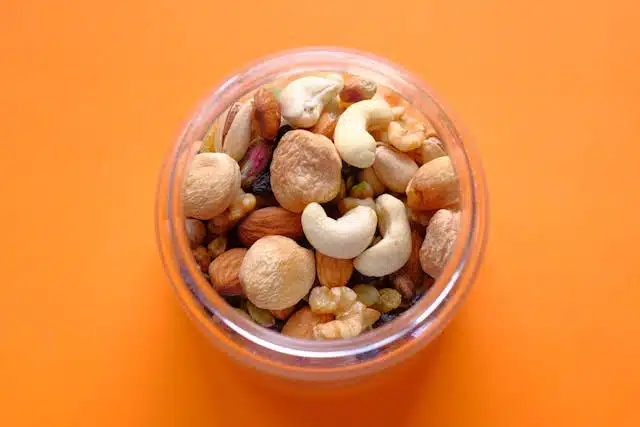Top 10 Foods for Mental Health: Nutritionist Approved
Mental health is, unfortunately, a topic that is largely misunderstood.
Mental health is a crucial aspect of overall well-being that influences how we think, feel, and act; and there are numerous factors that contribute to mental health.
Amongst the factors that collectively comprise your mental health, I believe nutrition is one of the easiest ways for people to support their mental health and feel better daily.
How Do the Foods We Eat Affect Our Mental Health?
Nutrition plays a vital role in maintaining and enhancing mental health because the brain requires a range of nutrients to function optimally, and deficiencies in these nutrients can negatively impact mood, cognitive function, and emotional stability.
Understanding which nutrients are important and how they support mental health can help in making better dietary choices.
Here is some guidelines to helping you choose foods that boost mental health more commonly:
Important Nutrients for Mental Health
- Omega-3 Fatty Acids: Found in fatty fish, walnuts, and flaxseeds, omega-3s are essential for brain health. They support synaptic plasticity and the production of neurotransmitters that regulate mood, such as serotonin and dopamine.
- B-Vitamins: Folate, B6, and B12 are crucial for neurotransmitter production. Leafy greens, beans, and whole grains are excellent sources. Deficiencies in these vitamins have been linked to depression and cognitive decline .
- Magnesium: This mineral supports neurotransmitter function and helps reduce symptoms of depression and anxiety. Nuts, seeds, and leafy greens are rich in magnesium.
- Antioxidants: Vitamins C and E, found in berries, nuts, and seeds, protect the brain from oxidative stress and inflammation, which can negatively affect mental health.
- Tryptophan: An amino acid found in turkey and chickpeas, tryptophan is a precursor to serotonin, a neurotransmitter that regulates mood, sleep, and appetite. Increasing dietary tryptophan can improve mood and reduce symptoms of depression.
- Vitamin D: Essential for brain health and mood regulation. While dietary sources are limited, sunlight and supplements can help maintain adequate levels. Low Vitamin D levels are linked to depression and cognitive decline.
- Probiotics: Found in fermented foods like yogurt and kefir, probiotics support gut health, which is closely linked to mental health. A healthy gut microbiome promotes serotonin production and reduces inflammation, benefiting overall mood and cognitive function.
Best Foods for Mental Health
Whether working on your own issues or trying to help someone with mental health problems, encouraging a healthy diet with nutrient-dense, anti-inflammatory foods is an excellent way to improve your overall wellness and mental health.
With that being said, here are the top 10 foods you can eat to support your mental health:
1.) Fatty Fish

Fatty fish such as salmon, mackerel, and sardines are high in omega-3 fatty acids, which are essential for brain health and have been linked to lower levels of depression and anxiety.
Research suggests that omega-3s enhance synaptic plasticity and promote the production of neurotransmitters that regulate mood, so consuming a diet high in fatty fish is one of the simplest ways you can support your mental health.
Although there are some concerns about the mercury content of certain types of fish, consuming a diet high in omega-3-rich fatty fish is commonly related to good mental and physical health.
Benefits:
- Mood Stabilization: Omega-3s help reduce symptoms of depression.
- Cognitive Function: Improves memory and cognitive performance.
- Brain Structure: Promotes healthy brain cell membranes and reduces inflammation.
2.) Leafy Greens
Leafy greens like spinach, kale, and Swiss chard are packed with folate, a B vitamin that helps produce dopamine and serotonin, neurotransmitters associated with happiness and relaxation.
Low levels of folate have been linked to depression and cognitive decline, so regularly consuming green juices, green smoothies, salads, or other forms of leafy green vegetables is an excellent way to support your mental health.
Benefits:
- Neurotransmitter Production: Supports the synthesis of dopamine and serotonin.
- Cognitive Health: Enhances memory and learning capabilities.
- Mood Improvement: Reduces the risk of depression.
3.) Nuts and Seeds

Nuts and seeds, especially almonds, walnuts, and flaxseeds, are rich in magnesium and healthy fats.
Magnesium is known to support neurotransmitter function and reduce symptoms of depression.
Walnuts, in particular, contain high levels of omega-3 fatty acids, which are beneficial for brain health.
Benefits:
- Neurotransmitter Function: Magnesium aids in neurotransmitter activity.
- Mood Regulation: Helps in reducing anxiety and depression.
- Brain Health: Provides essential fats that support overall brain function.
4.) Berries
Berries such as blueberries, strawberries, and raspberries are high in antioxidants.
Antioxidants protect the brain from oxidative stress and inflammation, which can affect mental health.
Regular consumption of berries has been associated with delayed brain aging and improved cognitive function.
Benefits:
- Oxidative Stress Reduction: Antioxidants neutralize harmful free radicals.
- Cognitive Function: Enhances memory and learning.
- Brain Health: Protects brain cells from damage.
5.) Whole Grains
Whole grains like oats, quinoa, and brown rice provide a steady source of energy and are high in fiber, which helps regulate blood sugar levels and mood swings.
Complex carbohydrates in whole grains increase serotonin levels, a neurotransmitter that contributes to feelings of well-being.
Benefits:
- Energy Regulation: Provides a steady release of glucose for brain function.
- Mood Stability: Prevents mood swings by stabilizing blood sugar levels.
- Serotonin Production: Promotes the production of serotonin.
6.) Fermented Foods

Fermented foods such as yogurt, kefir, kimchi, and sauerkraut contain probiotics that support gut health, and a healthy gut is linked to improved mood and reduced anxiety through the gut-brain axis.
Probiotics also influence the production of neurotransmitters and reduce inflammation, so consuming probiotic-rich foods is one of the simplest ways to support your mental health.
Probiotic supplements are also effective, but consuming probiotic-rich foods is a more holistic approach to supporting overall health.
Benefits:
- Gut Health: Probiotics support a healthy microbiome.
- Mood Improvement: Linked to reduced symptoms of anxiety and depression.
- Neurotransmitter Production: Influences the production of key neurotransmitters.
7.) Avocados
Avocados are rich in healthy fats, particularly monounsaturated fats, which support brain function.
They also contain vitamin E, which protects the brain from oxidative stress.
Furthermore, avocados are a great source of folate and vitamin K, essential for cognitive health.
Avocados are easy to use, but I have found that making avocado toast that contains around 575 calories per serving is a great mid-day snack for my wife and I.
Benefits:
- Brain Function: Supports cognitive processes and memory.
- Oxidative Stress Protection: Vitamin E acts as an antioxidant.
- Nutrient-Rich: Provides essential vitamins and minerals for brain health.
8.) Dark Chocolate
Dark chocolate with a high cocoa content is rich in flavonoids, caffeine, and theobromine, which enhance brain function and mood.
Moderate consumption of dark chocolate can boost endorphin and serotonin levels, leading to improved mood and cognitive performance.
Benefits:
- Mood Enhancement: Increases endorphin and serotonin levels.
- Cognitive Function: Flavonoids improve blood flow to the brain.
- Antioxidant Properties: Protects brain cells from damage.
9.) Turmeric
Turmeric contains curcumin, a compound with powerful anti-inflammatory and antioxidant properties.
Curcumin has been shown to cross the blood-brain barrier and may help improve mood and reduce depression symptoms.
It also promotes brain-derived neurotrophic factor (BDNF), which supports brain health.
Benefits:
- Anti-Inflammatory: Reduces inflammation in the brain.
- Mood Improvement: Helps alleviate symptoms of depression.
- Brain Health: Promotes the production of BDNF.
10.) Beans and Legumes
Beans and legumes, such as lentils, chickpeas, and black beans, are high in protein, fiber, and B-vitamins.
These nutrients support brain function and stabilize mood by maintaining steady blood sugar levels.
They also contain antioxidants that protect the brain from oxidative stress.
Chickpeas are unique because they are an excellent source of tryptophan.
The tryptophan in chickpeas aids in the production of serotonin, and chickpeas also provide complex carbohydrates that help in the absorption of tryptophan into the brain, enhancing mood and cognitive function.
Benefits:
- Mood Stability: Prevents blood sugar fluctuations.
- Brain Function: Provides essential nutrients for cognitive health.
- Antioxidant Properties: Protects brain cells from damage.
Additional Noteworthy Foods & Drinks for Mental Health

If you’d like a more detailed look at the foods and drinks that most affect your mental health, Dr. Uma Naidoo’s book This Is Your Brain on Food provides an in-depth look at how your diet affects your mental health.
With that being said, here are three additional foods and drinks that you should try to include in your diet more often to improve your mental health:
Eggs
Eggs are an excellent source of choline, a nutrient that supports the production of acetylcholine, a neurotransmitter important for cognitive function and brain health, mood and memory.
Benefits:
- Cognitive Support: Enhances memory and brain function.
- Mood Regulation: Supports neurotransmitter production.
Green Tea
Green tea contains L-theanine, an amino acid that promotes relaxation and reduces stress.
It also has antioxidants that protect the brain from oxidative damage.
Benefits:
- Stress Reduction: L-theanine promotes calmness.
- Cognitive Function: Enhances mental clarity and focus.
Pumpkin Seeds
Pumpkin seeds are rich in magnesium and zinc, which are essential for brain health.
Magnesium helps with stress reduction, while zinc supports neurotransmitter function.
Benefits:
- Stress Management: Magnesium helps alleviate anxiety.
- Neurotransmitter Support: Zinc supports cognitive function and mood stability.



